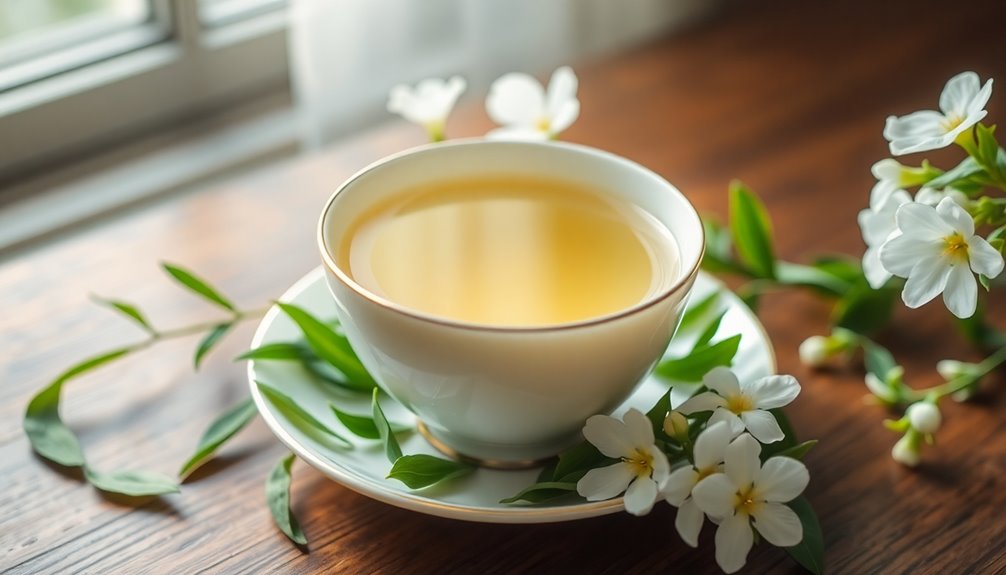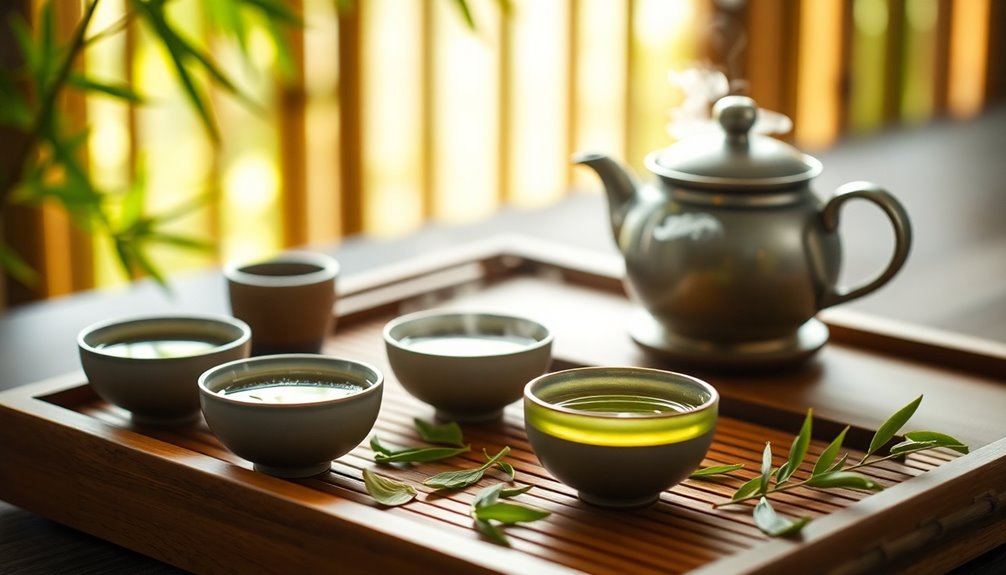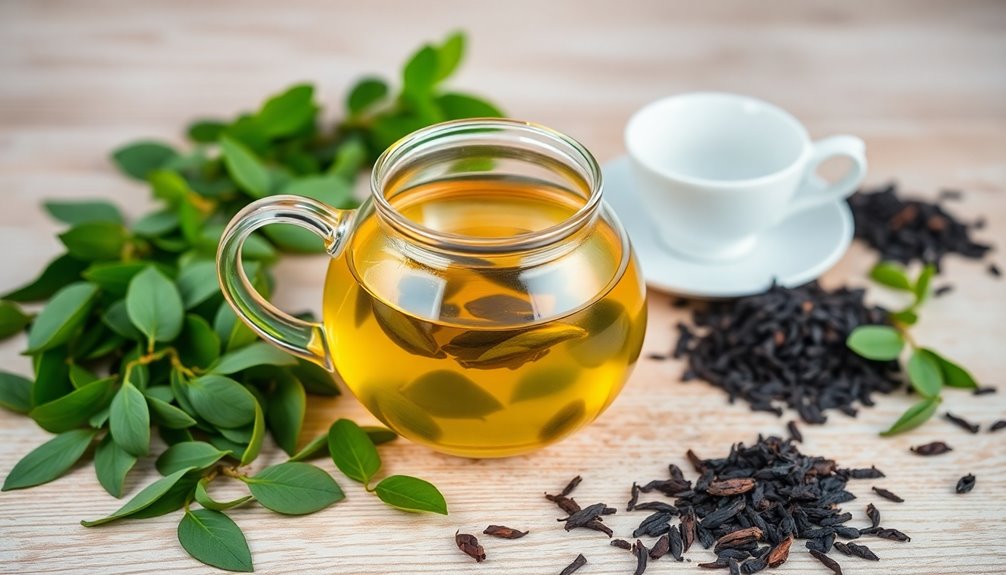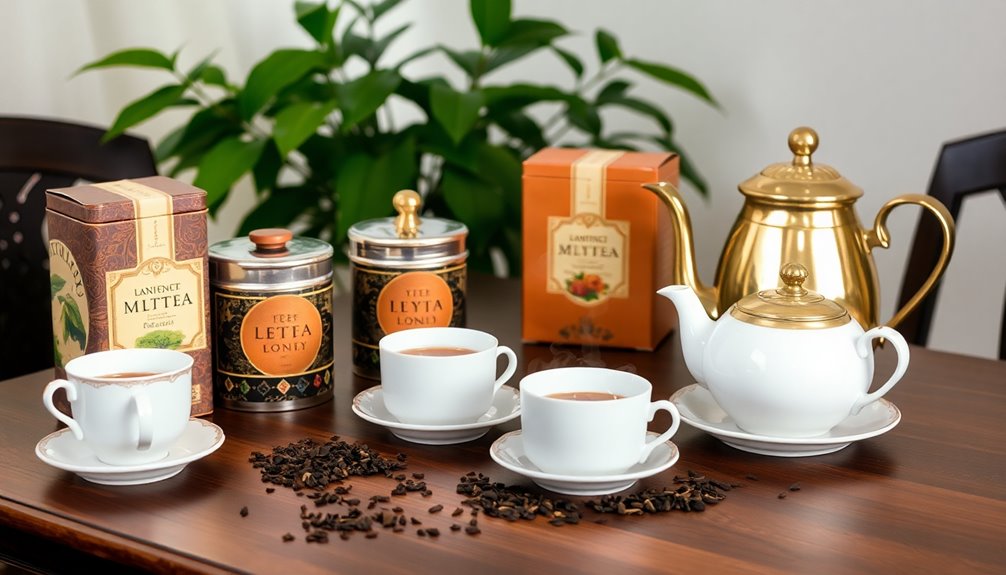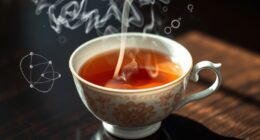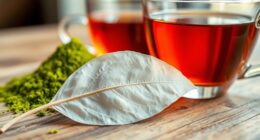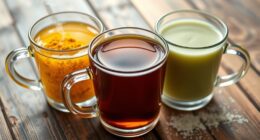White tea is a hidden gem among teas, and it's time you give it a try! It's loaded with antioxidants, which help protect your body from damage and support your immune system. Drinking white tea can lower your risk of heart disease and even boost your metabolism, helping you burn extra calories. Plus, its unique harvesting process preserves its delicate flavors and benefits. While it may not be as common as green or black teas, its rarity makes it special. Explore this refreshing drink, and you're sure to discover even more reasons to love it!
Key Takeaways
- White tea is rich in antioxidants, offering more than green or black teas and protecting against cell damage and inflammation.
- Regular consumption can reduce heart disease risk by about 21% and boost metabolism, aiding in weight management.
- Its cancer-fighting properties show effectiveness against lung and colon cancer cells, making it a powerful health ally.
- The delicate harvesting methods ensure minimal processing, preserving the natural flavors and health benefits of the tea.
- Limited availability and traditional sourcing from Fujian province enhance its luxury status, making it a rare yet beneficial choice.
Introduction
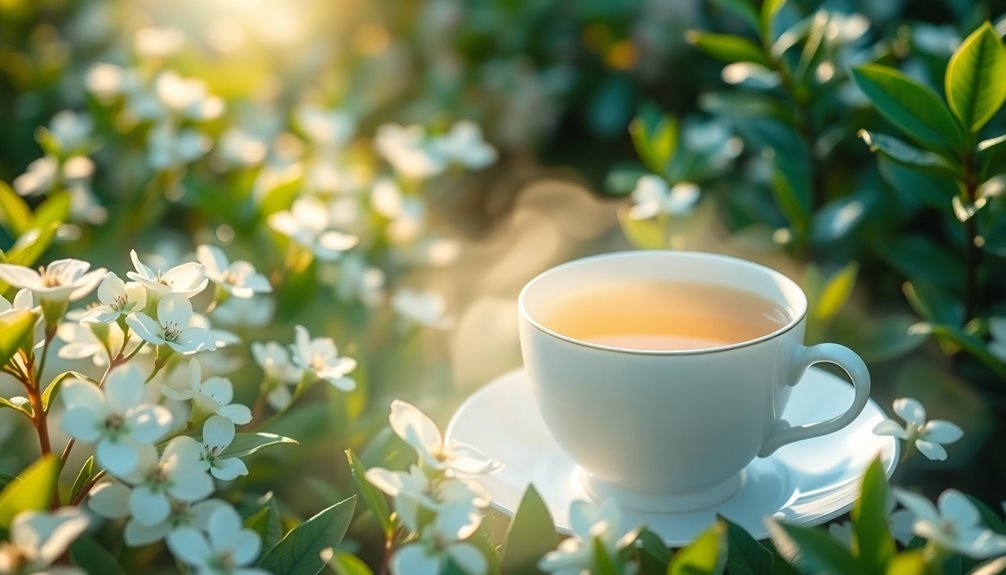
White tea, often regarded as a delicate and sophisticated beverage, is gaining recognition for its impressive health benefits. Unlike other teas, white tea is the least processed, made from young buds and leaves of the *Camellia sinensis* plant. This means it retains higher levels of antioxidants, making it a powerhouse for your health.
When you sip white tea, you're getting a rich source of polyphenols and catechins. These compounds help lower the risk of heart disease by about 21% when consumed regularly.
Plus, if you're looking to manage your weight, white tea can boost your metabolism and enhance fat breakdown, potentially helping you burn an extra 70-100 calories each day.
But that's not all! The antioxidants in white tea are linked to cancer-fighting properties, showing effectiveness against lung and colon cancer cells.
Regularly enjoying this tea may also enhance your immune function and offer neuroprotective benefits, reducing the risk of diseases like Alzheimer's and Parkinson's.
Origin of White Tea
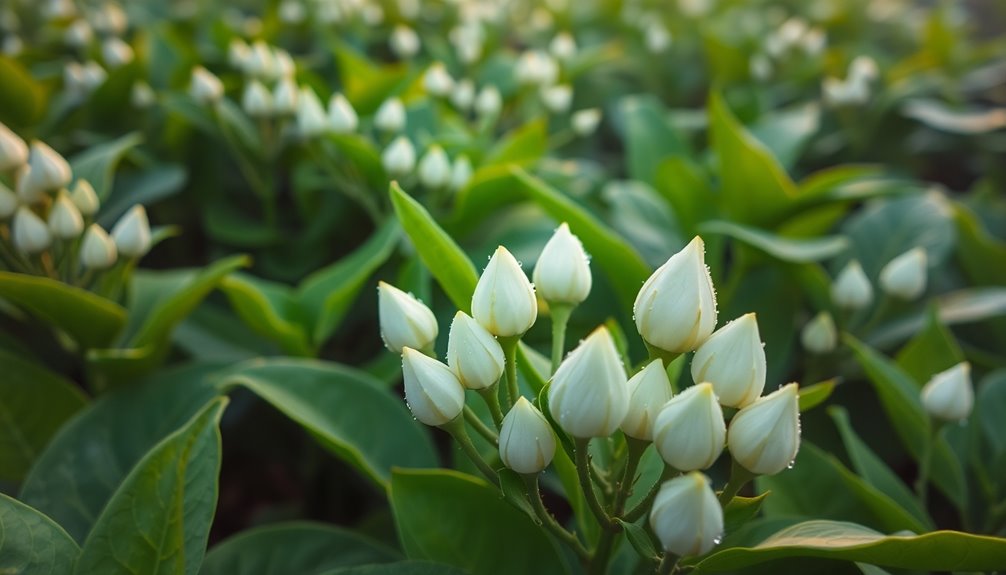
Originating in the Fujian province of China, white tea has a rich history that spans over a thousand years, possibly tracing back to the Tang dynasty. This unique tea is made from the youngest tea buds and leaves, which undergo minimal processing. This careful method helps preserve their natural qualities and delicate flavor.
White tea was highly prized by the Chinese imperial court, often gifted to royalty due to its rarity and exquisite taste. The fine white hairs present on the tea buds when picked give white tea its name. These young tea buds aren't just beautiful; they're also key to the tea's special qualities.
In the 19th century, white tea gained popularity beyond China, leading to its production in countries like India, Sri Lanka, and Nepal. This spread helped more people experience the charm of white tea.
Today, you can find it enjoyed by many around the world. Understanding the historical significance of white tea adds to its allure, making each cup not just a drink, but a taste of history.
High Antioxidant Content
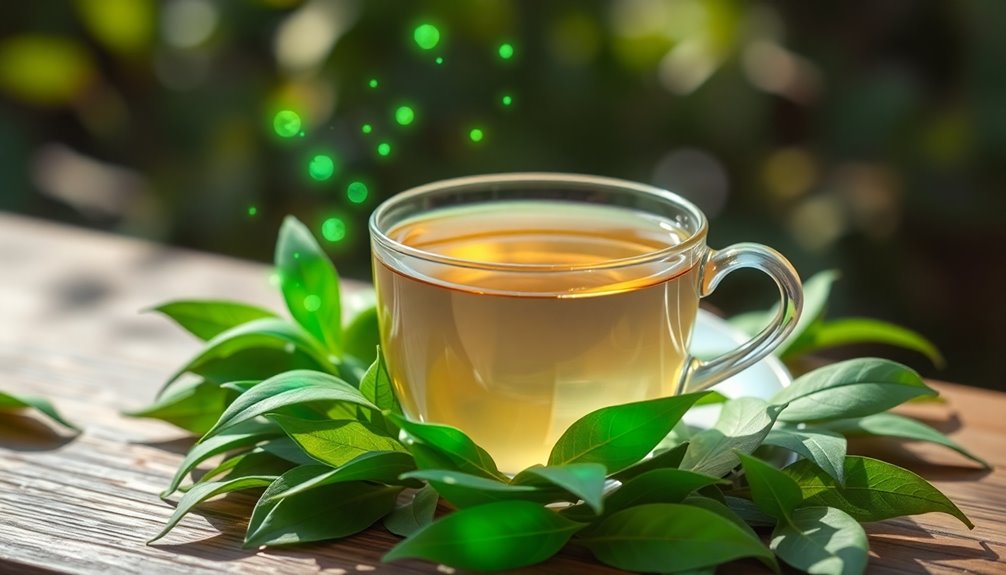
Packed with powerful antioxidants, white tea stands out as one of the healthiest beverages you can enjoy. Its high levels of polyphenols, especially catechins, make it a champion in fighting free radicals. These antioxidants protect your cells from damage, which can help reduce inflammation and lower your risk of diseases like heart disease and cancer.
In fact, white tea has a higher antioxidant content than both green and black teas, making it a rich source of health benefits.
When you sip on a cup of brewed white tea, you're getting all these perks for virtually no calories. This calorie-free drink allows you to indulge without the added sugars or calories found in many other beverages.
Plus, while more studies are needed on humans, test-tube research suggests that white tea might even help trigger cell death in cancer cells and suppress tumor growth.
Rare Chinese Harvesting Methods

In the lush hills of Fujian province, tea harvesters carefully pick the delicate buds and young leaves of white tea during the early spring months of April and May. This unique harvesting process is all about precision. They select only the top two leaves and the bud from each tea plant, ensuring that you get the youngest and most tender parts for your cup of tea.
White tea is special because it undergoes minimal processing. After being picked, the delicate buds and young leaves are withered in the sun and then dried. This gentle handling helps preserve the natural antioxidants and flavors that make white tea so beneficial for your health.
The traditional method of harvesting white tea is labor-intensive, taking time and care. This dedication contributes to its status as a luxury item, once enjoyed only by Chinese royalty.
Among the rarest varieties is Silver Needle, known for its exquisite taste and health benefits. The unique climate and soil conditions of Fujian province allow these prized cultivars to thrive, making every sip of white tea a special experience.
Limited Availability and Sourcing

Finding high-quality white tea can be quite the challenge due to its limited availability. This special tea is mainly sourced from the Fujian province in China, where it's been made for over a thousand years. With such a long history, white tea is considered a traditional tea, but its delicate flavor makes it less common than green or black teas.
Even though white tea is gaining popularity, you might still struggle to find it in your local grocery store. While some production methods have spread to India, Sri Lanka, and Nepal, authentic white tea remains rare.
If you're eager to enjoy its health benefits, look for high-quality options online or at specialty health food stores.
When shopping, choose reputable brands that source their leaves from well-known estates. This ensures you're getting the best flavor and quality.
Practical Applications
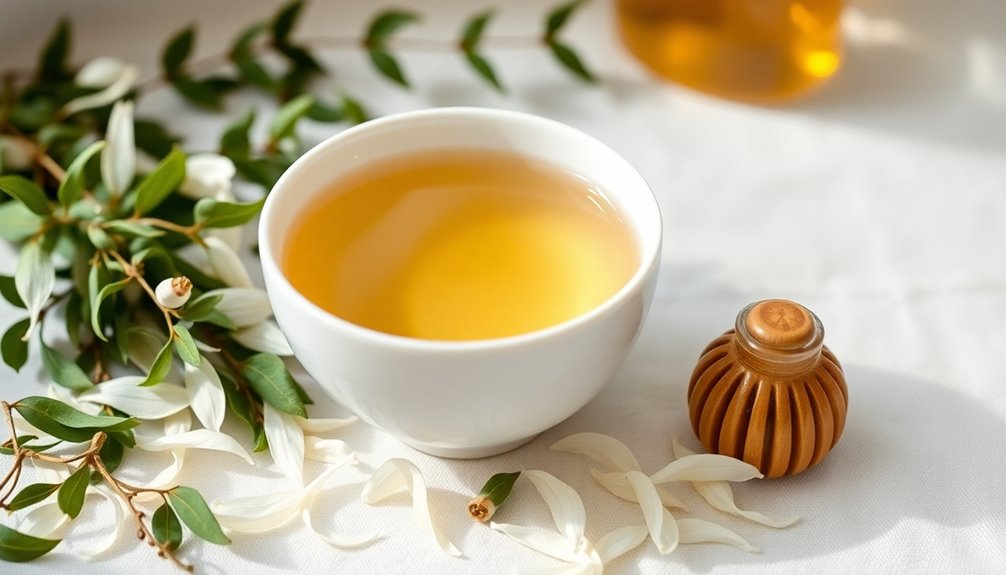
Incorporating white tea into your daily routine is both simple and rewarding. You can enjoy 2-3 cups a day to maximize its health benefits. Drinking white tea can support heart health and assist with weight management. Plus, its delicate flavor makes it great for any occasion.
You can sip it hot with your meals or refresh yourself with a cold iced version to enhance your hydration. When preparing white tea, remember to steep it at temperatures between 160-185°F for 4-5 minutes. This helps preserve its delicate flavor and beneficial compounds, like antioxidants, which can help reduce inflammation and lower the risk of chronic diseases.
Finding white tea is easy, as it's available in both loose leaves and tea bags. Choose from a variety of brands that suit your taste.
By adding white tea to your diet, you're taking a step toward a balanced lifestyle. It complements your other healthy habits and contributes to your overall wellness.
Frequently Asked Questions
Is White Tea the Healthiest Tea?
You might find white tea to be one of the healthiest options available. Its rich antioxidants, lower caffeine, and potential benefits for heart health and metabolism make it a smart choice for your wellness routine.
What Is the Healthiest Tea for Your Body?
When considering the healthiest tea for your body, you should explore various options. White tea stands out due to its high antioxidant levels, heart health benefits, and potential for boosting metabolism, making it an excellent choice.
Does White Tea Help With Belly Fat?
Yes, white tea can help with belly fat. Drinking three or more cups daily may boost your metabolism, enhance fat oxidation, and reduce insulin resistance, making it a supportive choice in your weight management efforts.
What Makes White Tea Special?
White tea's special because it's the least processed, preserving high antioxidant levels. It supports heart health, may aid in weight management, and offers potential anticancer properties, making it a unique choice for health-conscious drinkers like you.
Conclusion
So, now you know why white tea is a great choice for your health! With its high antioxidants and special harvesting methods, it offers unique benefits you might not find in other teas. Plus, it's not always easy to find, which makes it even more special. Next time you're at the store, give white tea a try and enjoy its delicate flavor. Your body will thank you, and you might just discover your new favorite drink!

